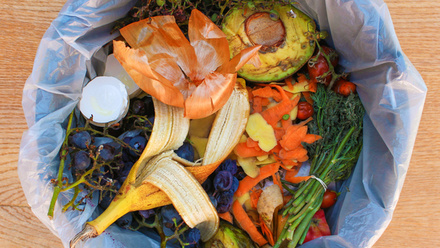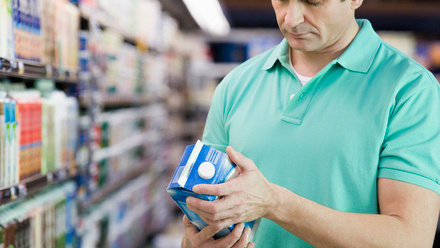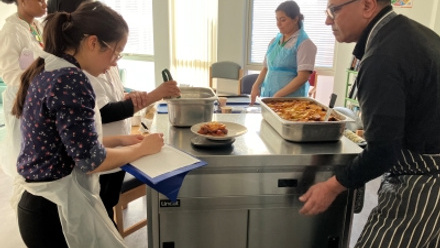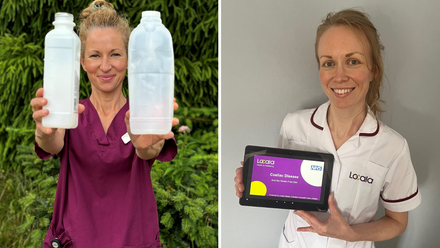Dietitians call for us to switch to more sustainable shopping practices to support our health, as well as the planet.
The BDA is encouraging us to make better choices, from the food we buy, to how we store and eat it, not only to lessen the burden on our pockets but also to support our health and that of the planet too.
Without doubt, the pandemic sped up our adoption of online shopping and made it incredibly convenient to get pre-prepared ingredients and hot meals delivered to our homes, at a time when businesses needed our support and we couldn’t go out. However, in February 2022 Deliveroo reported that more than 8 out of 10 customers were ordering deliveries with the same or higher frequency than during the peak of the pandemic.
Registered Dietitian and BDA Chair, Caroline Bovey says, “This is good news for restaurants and for the delivery companies but we are asking everyone to consider what potential impact this is having on their health, their bank balance, and the planet. How much food in your fridge and cupboards, for example, might go to waste on a weekly basis because of the decision to order in again?”
Figures from the Waste and Resources Action Programme (WRAP)* show that in the UK, we are wasting 4.4 million tonnes of edible food, which equates to £14.9 billion a year. Of that, 41% is thrown away because it wasn’t used in time, with potatoes, bread and milk the top foods likely to be tossed in the bin. All this food waste amounts to approximately £60 a month for a family with two children, at a time when energy prices are soaring and the cost-of-living crisis means that every penny counts.
With 35% of the UK’s greenhouse gas (GHG) emissions coming from food and drink,* due to the land, water and energy used in its production and importation, now is a good time to get the most out of every weekly shop and minimise its waste.
The BDA is kicking off Sustainable September by releasing tips to support us with making more sustainable, healthy choices that can reduce the amount of waste created - starting with the weekly shop.
Caroline adds, “This Sustainable September, we want to cut down on the food and drink that we are throwing away, this will not only help the environment but it will also help bank balances, as we could all do with a bit extra at the moment. By taking the time to look before we buy and plan for the week ahead - whether we order in or not - we can lessen our food waste.
“As a profession we have a role to play in supporting the public to make more environmentally sustainable decisions in a healthy and affordable way, that’s why we’ve come up with these small changes that each household could work toward implementing.
“We often talk about a sustainable diet involving eating more whole grain cereals and minimally processed vegetables, fruits and legumes in order to improve our health and lower GHG emissions, but even a small change of being more aware of the food that we already have in our cupboards, prior to us ordering in or shopping, is a good place to start this September.”
Rosa Holt, Registered Dietitian and member of the BDA's Sustainable Diets Group says, “Get creative in the kitchen and do your bit to stop wasting money and precious food. Challenge yourself to prepare a meal using what you’ve already got in the fridge, freezer and store cupboard. Remember you can substitute lots of ingredients when following recipes, such as swapping onions for leeks in an omelette or tinned cannellini beans for butter beans in a salad or casserole.”
A sustainable focus to food shopping can be managed with having some goals in place before you get there.
To reduce waste the BDA recommends:
Plan your meals and make a list before you go shopping. Remember what you’ve already got in which needs using up, and stick to your list.
Go shopping with a friend so you can split bulk-buy discounts between you – you’ll save the money but won’t end up wasting anything.
Don’t shop for food when you are hungry because you might buy foods you don't really need and spend more than your budget.
Check sell-by dates. Supermarkets reduce prices on products that are close to their sell by date and this can be a great way of picking up bargains. But before you fill your trolley, be sure you’ll use, or freeze everything you buy before it goes off.
Check out using free apps such as Olio, a food sharing app designed to reduce food waste.
Loose fruit and vegetables can be as little as half the price of pre-packaged items and give you the choice of buying only what you need.
Frozen and dried products are often cheaper than fresh varieties – and just as good for us.
Remember everyday items such as milk, cheese and bread can be grated or portioned and frozen if you are not going to use them up in time. Flavour packed fresh ginger and chillies can be frozen and grated or sliced straight in your cooking from the freezer. Fantastic for your next homemade curry night.
Keep an eye out for occasions when there’s a good deal on store cupboard ingredients that last. If you can afford to and you know you will use them, make use of deals on the like cans of pulses and tomatoes or packets of pasta, rice and cereals. But be sensible and think before you buy.
Throughout Sustainable September, the BDA will be releasing tips and information to support people with making more sustainable choices in simple ways. Visit the BDA social media channels to see how you can get involved.
The information here is general. If you have a medical condition, are pregnant or a child, please seek advice from a dietitian or health care team before making any changes to usual dietary advice.







